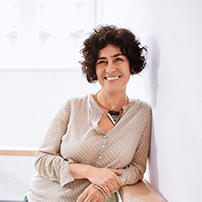
Harsanyi Eszter
Co-Founder & CEO, MagikMe
Hungary
Eszter’s second son, Áron, was six months old when the family learned he was suffering from epilepsy. It was a turning point in her life. She not only had to see him suffer from countless seizures, but also had to face open discrimination. Even though she came from an educated family, she was not equipped to prevent the heartbreaking experience of seeing other children simply leaving Áron out of the fun at the playground, and consequently missing out the first stage of socialization in his life. That’s the reason of establishing MagikMe
She has experienced how her non-disabled son had learned to play together with his disabled sibling while also seeing Áron’s kindergarten peers learn and enjoy playing together with him. These profound observations led her to start her work towards integrated communities. Over the past years, she managed to spread her message nation-wide and beyond Hungary’s borders.
Eszter uses playgrounds as a means of building community and turning segregated kindergartens into inclusive places where disabled and non-disabled children can play together, helping both develop into more emphatic, cooperative and tolerant adults.
Aspiring to alleviate social exclusion experienced by families with young disabled children, Eszter co-founded MagikMe, a social venture engaged in the production of inclusive playground equipment, the development and support of local communities, as well as in working with kindergarten teacher training institutions to spread the necessary tools and know-how for inclusive kindergartens.
As playgrounds are essential community spaces in Hungary, she works to transform these popular sceneries to become a vehicle of change towards an inclusive and emphatic society. Eszter envisions integrated communities, where families with disabled children can have an empowering local support network, which has the potential to raise real inclusivity on an institutional level through effective self-advocacy and leading by example. The experience of playing together at playgrounds in early childhood produces a long lasting effect on the socio-emotional development of abled and disabled children alike. Playing together in early childhood also prepares these children to continue to play and work together as they become classmates in kindergartens, thus breaking down biases in the early formative years.
The lack of public awareness, ineffective policies and a segregated education cause life-long isolation for this group. These children miss out on integration opportunities in their early years and remain hidden throughout their lives. This life-long isolation makes it impossible for them to become contributing members of society and to pursue opportunities society has to offer to live a fulfilling life. After starting their early years of social interaction in a segregated institution, usually far from their home, with limited resources, there is slight chance to break out
Eszter provides playground equipment that allows disabled and non-disabled children to play together and thus enjoy the first socializing platform to start the integration process of families with disabled children. Eszter’s social venture designs and produces this playground equipment that enables children with different kinds of disabilities and non-disabled children to interact directly. It is important to note that current ‘accessible’ playground equipment discourages families with younger disabled children to participate, as it requires children to be strong enough to operate a wheelchair or to hold onto handles, which is not possible for many young children with disabilities. In contrast, Eszter’s equipment allows all children to play together, regardless of their level of ability.